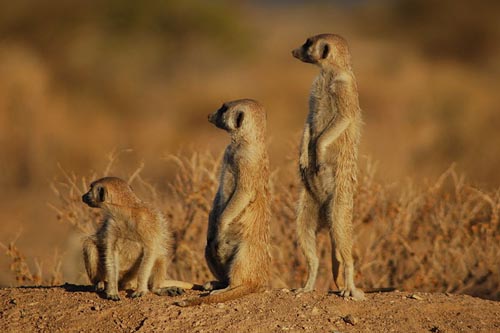MEERKATS do not live a seemples life, a study suggests – many of the furry desert animals are inbred, which impacts on their chances of survival.
Scientists studying a population of the animals in the wild – which live in groups of up to 50 individuals, where subordinate adults help parents care for their offspring – were surprised to find that almost half showed some evidence of inbreeding.
The research, by the Universities of Edinburgh, Cambridge, Zurich and the Zoological Society of London, examined data from almost 2000 wild meerkats in groups at the Kuruman River Reserve in the Kalahari Desert, South Africa.
The cuddly animals are at risk from inbreeding Photo:Sara&Joachim
The 20-year study recorded births, deaths and movement of meerkats between colonies. Newborn pups were weighed and measured, and their DNA analysed. Scientists observed which females were pregnant, and combined this information with genetic evidence to determine the parentage of pups.
Researchers found that 44 per cent of meerkats showed some evidence of inbreeding, and pups that were inbred were smaller, lighter and less likely to survive than their outbred counterparts.
Their work showed that closely related meerkats never breed with each other, but inbreeding occurred between more distantly related individuals who were unfamiliar with one another, for example because they lived in separate groups.
This research provides rare evidence of the extent of inbreeding among social animals such as meerkats, and raises questions of whether other similarly social mammals – such as other mongeese, prairie dogs and tamarin monkeys – are similarly affected.
The study, published in the journal Molecular Ecology, was supported by the Natural Environment Research Council.


